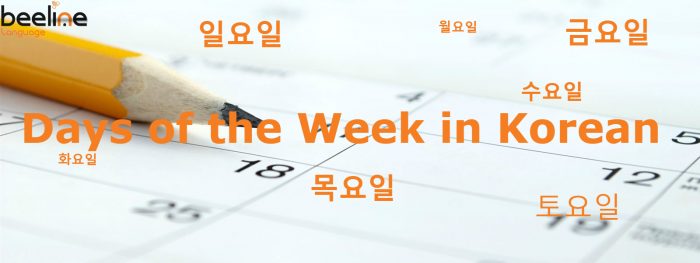
When you learn to speak and write Korean, you like to visit our Beeline Korean blogs online. Correct? Which day of the week do you usually visit our blog? Mondays? Tuesdays? Wednesdays? Can you say that in Korean? What? You do not know how to? Don’t worry. Today, we will learn how to say each day of the week in Korean, so you could answer my question in Korean by the end of this blog posting.
How to Say Each Day of the Week in Korean
You can see the pattern, where each day is spelt with ‘요일’ [yo-ill], meaning ‘day’ in Korean, and just like in English, there are special words to represent each day of the week in Korean.
Monday -월요일 [Wall-yo-ill]
Tuesday – 화요일 [Hwa-yo-ill]
Wednesday – 수요일 [Soo-yo-ill]
Thursday – 목요일 [Mok-yo-ill]
Friday – 금요일 [Geum-yo-ill]
Saturday – 토요일 [To-yo-ill]
Sunday – 일요일 [Ill-yo-ill]
Also, you remember our previous posting, 불금 [Bulgeum] is a mixture of the Korean words for “Fire” and “Friday”. 불 [bul] means fire, and 금 [geum] is short for 금요일 [Geum-yo-il] which is Friday.
Sample Sentences Using Each Day of the Week in Korean
나는 매주 금요일마다 축구를 해. [na-neun mae-joo geum-yo-ill ma-da chook-goo-reul hae]
I play soccer every Fridays.
우리는 다음주 토요일에 영화를 보러 갈꺼야. [woori-neun da-um-joo to-yo-ill-ae young-hwa-reul bo-reo gal-ggeo-ya.]
We are going to watch a movie on the Saturday of next week.
Meaning Behind Each Day of the Week in Korean.
Each days of the week in Korean has special meanings. They all have 요일[yo-ill] at the end, to represent ‘day’, but each day of the week is represented by specific words. Monday means moon, Tuesday means fire, Wednesday means water, Thursday means wood, Friday represents gold, while Saturday and Sunday each represents land(soil) and Day. These meaning are originated in Chinese letters, and widely used in eastern traditional theology practices.
Now that you know how to say each day of the week in Korean, go ahead and answer my question. Which day of the week do you visit our blogs usually?
Happy Studying everyone!



